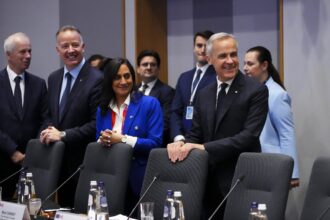In a strategic move that signals continued scientific cooperation despite mounting geopolitical tensions, Canadian and European space officials gathered in Brussels yesterday to sign a landmark agreement reinforcing their decades-long partnership in space exploration and satellite technology development. The timing of this renewed commitment carries particular significance as global economic instability and shifting political alliances have threatened international scientific collaboration in recent months.
“This agreement represents more than just technological cooperation—it’s a declaration that scientific progress transcends political boundaries,” said Marc Garneau, Canada’s Minister of Innovation, Science and Industry, during the signing ceremony at the European Space Agency headquarters. “When we look to the stars, we do so with a unified vision that benefits all humanity.”
The new framework extends the existing collaboration for another ten years while significantly expanding joint initiatives in Earth observation, satellite communications, and deep space exploration. According to CO24 Business analysis, the partnership is expected to generate approximately $3.7 billion in economic activity and create over 5,000 specialized jobs across both Canadian and European aerospace sectors.
European Space Agency Director-General Josef Aschbacher emphasized the practical implications of the agreement. “Our enhanced collaboration with Canada comes at a critical moment. The data collected through our joint Earth observation satellites will provide crucial information about climate change patterns that neither entity could gather independently,” Aschbacher explained.
The agreement builds upon previous successful collaborations, including Canada’s significant contributions to the International Space Station and the joint development of the RADARSAT Constellation Mission. However, this latest partnership extends beyond traditional areas to include emerging technologies like space debris management and lunar resource utilization.
Economic analysts tracking the Canada News landscape note that this agreement provides much-needed stability for Canada’s aerospace industry, which has faced uncertainty following recent defense spending reassessments. The guaranteed European partnership offers predictable funding streams and technology transfer opportunities that will benefit Canadian firms like MDA and Telesat.
“In an era where we’re seeing increased competition in space from private companies and nations like China and India, this type of international cooperation provides Canada with capabilities we simply couldn’t develop independently,” said Dr. Sarah McKenzie, aerospace policy expert at the University of Toronto.
The partnership isn’t without challenges. Funding allocation remains a contentious issue, with Canada committing approximately €500 million over the next decade—a figure some critics argue is insufficient given the expanding scope of planned missions. Additionally, regulatory harmonization between Canadian and European space standards presents ongoing technical hurdles that must be addressed.
Despite these concerns, the renewed collaboration marks a rare bright spot in international relations at a time when World News headlines are dominated by trade disputes and diplomatic tensions. The agreement explicitly includes provisions to insulate scientific cooperation from political disagreements, establishing independent oversight mechanisms to ensure continuity regardless of changing governments.
For ordinary Canadians, the partnership promises tangible benefits beyond scientific advancement. Enhanced Earth observation capabilities will improve weather forecasting accuracy, provide better monitoring of the Arctic region, and strengthen emergency response systems during natural disasters. Additionally, educational initiatives included in the agreement will create opportunities for Canadian students to participate in European space research programs.
As humanity stands at the threshold of a new era in space exploration, with planned lunar and Martian missions on the horizon, this reinforced partnership raises an essential question: In a world increasingly defined by competition and national self-interest, can space exploration remain the domain where international cooperation still prevails?
























